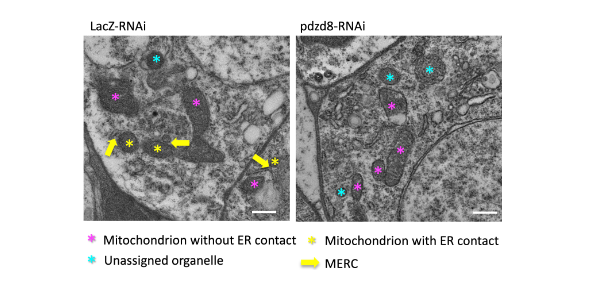
Submitted by Penny Peck on Fri, 15/07/2022 - 15:33
Mitochondria-endoplasmic reticulum (ER) contact sites (MERCs) orchestrate many important cellular functions including regulating mitochondrial quality control through mitophagy and mediating mitochondrial calcium uptake.
In a new paper from the Mitochondrial Neurodegeneration group, Dr Victoria Hewitt, with other members of the Whitworth and Prudent labs, and collaborators from King’s College London and Columbia University, provide the first description of the impact of reducing pdzd8-mediated MERCs in vivo using Drosophila. They find that this slows age-associated decline in locomotor activity and increases lifespan. In contrast, increasing MERCs by expressing a constitutive, synthetic ER-mitochondria tether disrupts mitochondrial transport and synapse formation, accelerates age-related decline in locomotion and reduces lifespan.
While depletion of pdzd8 prolongs the survival of flies fed with mitochondrial toxins, it is also sufficient to rescue locomotor defects of a fly model of Alzheimer's disease expressing Amyloid β42 (Aβ42).
Together, these results provide the first in vivo evidence that MERCs mediated by the tethering protein pdzd8 play a critical role in regulating mitochondrial quality control and neuronal homeostasis.


